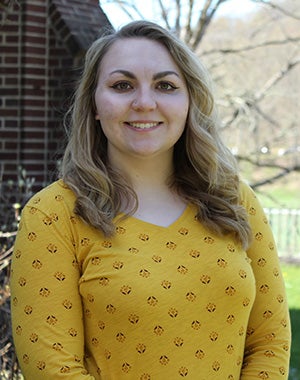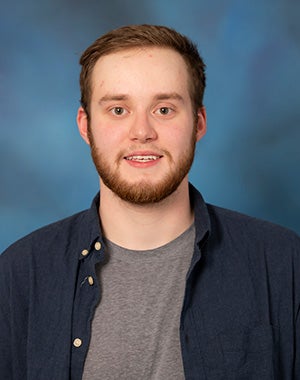
Subscribe to Pittwire Today
Get the most interesting and important stories from the University of Pittsburgh.Thirty-five undergraduate students at the University of Pittsburgh will receive $4,000 each and other support for their summer research as 2023 Brackenridge fellows. The fellowship, sponsored by the David C. Frederick Honors College, supports independently led research and creative projects and includes weekly seminars to enhance learning and idea exchange.
Since the fellowship's inception 30 years ago, Brackenridge fellows have come from every school and college on the University’s Pittsburgh campus. The 2023 cohort is the first to include students from a regional campus, Kaylee Huber and Ethan Crosby, rising sophomores in Pitt-Greensburg’s honors program.
This summer, Huber of California, Pennsylvania, pictured left, is using abstract algebra to discover the algorithms behind solving Rubik’s Cubes. The potential applications for such an algorithm could range from enhancing traffic flow on roads to computer programming, said Huber, who’s majoring in applied mathematics.
Crosby of Greensburg, Pennsylvania, pictured below, is dedicating his Brackenridge Fellowship to developing Roadar, an app that synthesizes weather and map data to provide drivers with real-time inclement weather information along their travel route. Crosby, whose major is currently undeclared, is optimistic that by the end of the summer, he will be ready to release the app for purchase.
The Brackenridge Fellowship, established by founding dean of the Honors College Alec Stewart, was created as a venue for undergraduate students from across disciplines to interact with each other and learn about what research looks like in different fields, said Brett Say, director of honors research programs. All majors are welcome to apply, and project proposals can range from creative to analytical scholarship.
“Sometimes when students hear the word ‘research,’ they think of white lab coats and beakers, or they think of an elderly bearded guy going through dusty books — and sure those are types of research, but research is done in every single discipline, from studio arts to bioengineering,” he said.
Interacting with a wide breadth of researchers is appealing, said Huber. She views the fellowship as a gateway to expanding the scope of her mathematical studies.
“After my time as a Brackenridge fellow, I will be experienced in multiple research methods so that I may branch out beyond the STEM field,” she said.
Here are the 2023 fellows:
- Michael Agadis, a politics and philosophy and economics major in the Kenneth P. Dietrich School of Arts and Sciences — “The Problem of Nihilism in Modern and Postmodern Literature”
- Roey Beniluz, a neuroscience major in the Dietrich School — “Susceptibility of Late Developing Interneurons to Alzheimer’s Disease in the Human Entorhinal Cortex”
- Grace Bohl, a neuroscience major in the Dietrich School — “Impact of MDD on Neuronal Maturation in the Human Amygdala”
- Ethan Crosby, of Pitt-Greensburg — “Roadar: A New Type of Weather App”
- Richa Desai, a computational biology and anthropology major in the Dietrich School — “Data Science in the Tropics: Infectious Disease Control in Colonial India”
- Connor Diaz, a history and law, criminal justice and society major in the College of General Studies — “Becoming American: Adopting the ‘American’ Identity”
- Erin Friel, a public and professional writing and anthropology major in the Dietrich School — “Changing with the Times: Discussing Linguistic Justice in University Settings”
- Isaac Gamwo, a psychology major in the Dietrich School — “Expanding the Scope to Expressing Pain”
- Megan Gauger, an environmental science major in the Dietrich School — “Integrating Plants and People to Inform Conservation of a Biodiverse Pittsburgh-Area Hotspot”
- Anna Gillen, a neuroscience major in the Dietrich School — “Understanding the Neurological Basis of Externalizing Behavior during Adolescence”
- Ella Hadden, a neuroscience major in the Dietrich School — “Sensory Input Effects on Olfactory Bulb Recovery”
- Megan Heim, a Spanish major in the Dietrich School — “Analyzing Manuscripts: The Ingenuity of Ramón Gómez de la Serna”
- Adam Hicks, an economics and mathematics major in the Dietrich School — “Sea Level Rise and the UK Housing Market”
- Harsh Hiwase, a molecular biology major in the Dietrich School — “Multiancestry GWAS and Functional Genomics Analysis to Define Novel Pathogenic”
- Kaylee Huber, an applied mathematics major at Pitt-Greensburg — “A Rubik’s Fantasy”
- Vasudha Iyer, a gender, sexuality and women’s studies major — “The Medicalization of Transgender Bodies and Trans Navigation of Gender-Affirming Care”
- Rohan Krishnan, an economics and business information systems major in the College of Business Administration — “A New Approach to Social Economic Policy: Leveraging Advanced Analytics and AI Economist to Solve Pittsburgh's Inequality Problems”
- Jason Lee, a computational biology major in the Dietrich School — “Using Hardware and Machine Learning to Identify Risk of Post Thrombotic Syndrome”
- Armani Manov, a computational biology major in the Dietrich School — “Cataloging Cell Cycles Across All Human Biology (CAAB)”
- Mary McFarland, a neuroscience major in the Dietrich School — “Role of Na/H Exchanger Isoform 1 in Reactive Astrocytes in AD Brains”
- Lily Natter, a nonfiction English writing major — “Translating and Digitizing Annotations in Federico Commandino's 1572 Latin Edition of Euclid's ‘Elements’”
- Jon Parikh, a film and media studies and economics major in the Dietrich School — “Pro Wrestling, Sports Entertainment, Semi-Nude Combat: Sport, Art, and What Entertains Us”
- Christopher Perrone, a molecular biology major in the Dietrich School — “Determining the Effects of a Changing Climate on Phenology of a Dioecious Species: Lindera benzoin”
- Alivia Pierce, an art history major in the Dietrich School — “The Black Struggle for Visibility: The Role of Protest Flyers and Posters During the 1960s and 1970s American Landscape and Beyond”
- Piper Read, a chemistry major in the Dietrich School — “Ozone in the Anthropocene: Modeling a Cleaner Future”
- Kavish Saini, a bioengineering major in the Swanson School of Engineering — “Mechanisms of Curiosity in the Primate Brain”
- Gavin Schmidt, a biological sciences major in the Dietrich School — “Thyroglobulin Fusions — A Thyroid Cancer Novelty”
- Jake Shapira, a biology and economics major in the Dietrich School — “Investigating the Role of Commensal Bacterium Veillonella Dispar in Preclinical Melanoma”
- Sasha Sluis-Cremer, a mathematics and computer science major in the School of Computing and Information — “Pontryagin Extremals of the Reinhardt Conjecture”
- Michael Sobol, a politics and philosophy and neuroscience major in the Dietrich School — “Life and Death: Re-Examining Natural Law in the Modern Clinical Context”
- Lillian Taylor, an environmental science major in the Dietrich School — “Connecting Pirates and the Environment Through the Colonial Imagination”
- Jacob Voelker, a neuroscience, history and philosophy of science major — “Technology, Culture, and Madness: Understanding Perceptions of Schizophrenia Through Technological Development”
- Simon Wang, a psychology and economics major in the Dietrich School — “Delayed Discounting as a Mediator of Childhood Stress and Depression”
- Niharika Welling, a computational biology major in the Dietrich School — “Advancing Angiogenesis Inhibitor Research for Clinical Translation”
- Madeline Wolfe, a biochemistry major in the Dietrich School — “Finding a Needle in a Haystack: Genetic Editing of Epstein-Barr Virus”
— Nichole Faina, photography by Aimee Obidzinski and Susan Isola




